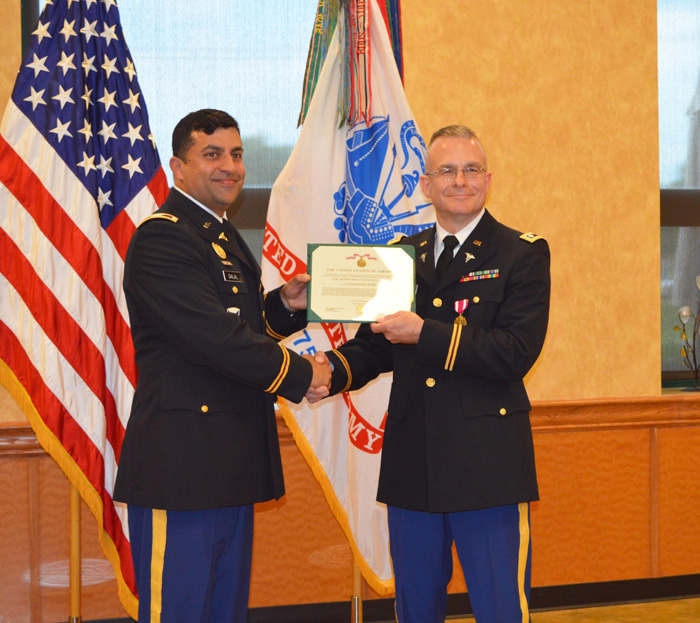Lt. Col. David Shoemaker retires after 20 years of military service

"I'm just a simple soldier..."
Joining the U.S. Army is not always a long-term commitment. Many young men and women join with the intent to serve three to five years, as was the plan of a young soldier named David Shoemaker. Shoemaker joined the Army with the intention of staying for his three-year commitment, while doing post-doctorate work developing the next-generation tularemia vaccine at Walter Reed Army Institute of Research.
Shoemaker enjoyed his time with the Army so much, he decided to stay in, and before he knew it, 20 years had flown by.
By the time Shoemaker got to WRAIR to study the tularemia vaccine, they had disbanded the program and he was assigned to another item.
"I got a great opportunity to work on the development of vaccines for group B meningococcal disease, and got experience in moving a vaccine from the research bench to phase 1 clinical trials, so it was very rewarding," said Shoemaker.
During his 20 years of service, he has been a part of many notable accomplishments, including:
- Running night-shift sample test operations at U.S. Army Medical Research Institute of Infectious Diseases for eight months beginning Sept. 11, 2001.
- Helping USAMRIID through the many inspections by the Centers for Disease Control, Department of the Army Inspector General, and Defense Threat Reduction Agency, while serving as the Director of Safety, Security and Biosurety.
- Assisting in getting the recent Portable Neuromodulation Stimulator development effort started, which has the potential to significantly influence treatment for Traumatic Brain Injury and other disorders.
Shoemaker's final assignment was at the U.S. Army Medical Materiel Development Activity at Fort Detrick, Md., where he served as the deputy director for the Division of Regulated Activities and Compliance.
"Lt. Col. Shoemaker built the foundation for USAMMDA being recognized as the medical device experts in MEDCOM. His contributions will have a long lasting positive impact in DRAC and our interaction with the U.S. Food and Drug Administration at the Center for Devices and Radiological Health and the FDA Office of the Commissioner's Office of Counterterrorism and Emerging Threats," said Robert Miller, director of DRAC. "He is such a man of principals that he was not afraid to inform Gen. Mattis, the Commander, United States Central Command, in person that a FDA un-cleared medical device could not be used in theater, and was successful."
"The reality for those of us that have worked with him is that he really is 'an officer and a gentleman,'" said Julia Donnelly, regulatory affairs scientist for DRAC. "He's always brought a sense of calm leadership in the face of serious problems, while at the same time he has always joined in on zaniness (teambuilding?!) that sometimes occurs in DRAC."
Shoemaker shared his plans to go back to school and take on sailing as part of his retirement.
"I will be taking advantage of the post-9/11 GI bill and attending the Landing School in Maine from September 2013 to June 2014," said Shoemaker. "I am enrolled in the Marine Systems program and will be getting my hands dirty learning how to repair marine diesel engines, electronics, refrigeration, fiberglass, etc. After that, my wife and I will be sailing on our own 40' sailboat 'Nonstop.'"
Shoemaker plans to cruise the East Coast for a couple years and then cross the Atlantic and visit Ireland and Europe.
Shoemakers' retirement ceremony was held at Fort Detrick on Jun. 28.
"He will be missed, and we will continue to build on the foundation he laid, but he can never be replaced," said Miller.
 An official website of the United States government
An official website of the United States government
 ) or https:// means you've safely connected to the .mil website. Share sensitive information only on official, secure websites.
) or https:// means you've safely connected to the .mil website. Share sensitive information only on official, secure websites.


